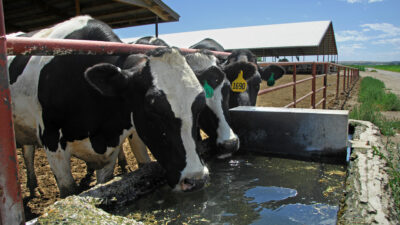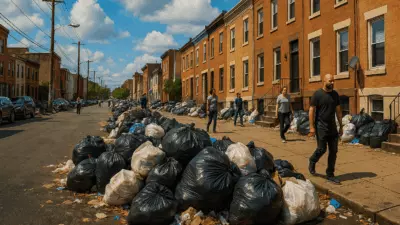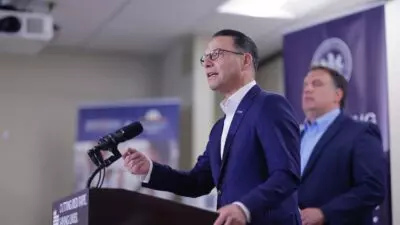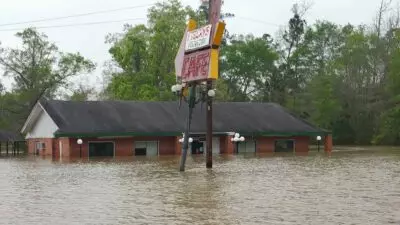Since March, Gov. Josh Shapiro and the Trump administration have been sparring over the cancellation of a program that provides millions in funding for Pennsylvania farmers who provide products for local food banks. There have been threats of a lawsuit, letters and public comments by state and federal officials.

“This isn’t some hope of mine that we would fund our farmers and our food banks,” Shapiro said during a press conference on April 21. “We had a three-year contract that the federal government broke in month four.”
The deal, the Local Food Purchase Assistance Cooperative Agreement Program (LFPA), was established in 2021 under President Joe Biden’s administration in response to the coronavirus pandemic. The latest contract was renewed in the final months of Biden’s term. However, Trump’s administration confirmed in March that the program was ending, impacting farmers and food banks across the nation.
Shapiro described LFPA as a “really successful program” through the Department of Agriculture that supported nearly 190 farms and 13 regional food banks across the state. On March 25, the governor said his administration sent an appeal to get the money they were supposed to be awarded, as well as a letter to the Trump administration. He reiterated that stance late last month and said the state is waiting on a response from the U.S. Department of Agriculture.
“I know I’m a former (state) attorney general and a lawyer, but you don’t need a law degree to know the ancient legal doctrine of a deal is a deal,” Shapiro said. “They made a deal with Pennsylvania. They’ve got to honor that deal. And I’m fighting for every dollar that’s owed to Pennsylvania.”
Shapiro’s comments on April 21 were the latest in the back-and-forth between his administration and the federal government as farmers and food banks wait for a resolution.
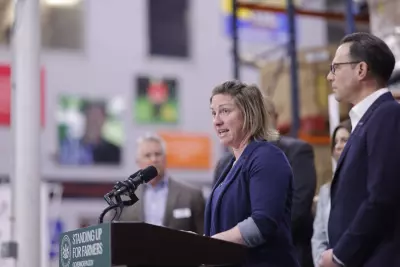
Amy Brickner is a third-generation dairy farmer in Carlisle, Cumberland County, who provides produce for the Local Food Purchase Assistance Program. (Courtesy of PAcast.)
How have farms and food banks been impacted?
A letter from the Shapiro administration lists all of the farms and products that are made available through the program. Feeding PA, which partners with farmers, released a sheet detailing LFPA’s impact.
“I want to be able to continue the impact that I’ve already had,” said Amy Brickner, a third-generation dairy farmer in Cumberland County who has participated in the LFPA program, during a press conference on March 25. “And that is from these grant programs for dairy farmers to help me cover the expenses and give back to my community.”
Logan Brace, owner of Brace’s Orchard, is a ninth-generation farmer in Luzerne County. He highlighted the relationship they’ve had with the Harry and Jeanette Weinberg NEPA Regional Food Bank as a result of the program, saying it has been “a tremendous help for our business.”
“Since LFPA funds have been available, we have worked together the past three seasons and look forward to continuing the relationship in 2025,” Brace wrote. “The food bank places regular orders and purchases some extra skids when we have surplus. These orders help cover the costs for harvesting and storing produce throughout the winter and spring.”
Food banks are also concerned their shelves will take a hit, and hurt people who rely on their services.
Joe Arthur, CEO of the Central Pennsylvania Food Bank, which serves 27 counties and more than 253,000 people each month, was appreciative of the Shapiro administration for bringing the issue to the public.
“For our food bank alone, that cut means losing $1.8 million over 15 months — that’s $120,000 a month and 500,000 meals that won’t reach the children and adults who rely on us,” Arthur said. “It also means fewer resources for our local farmers, who supply the fresh, nutritious food that makes this program so impactful. This isn’t just about meals—it’s about families, communities, and our local economy.” U.S.
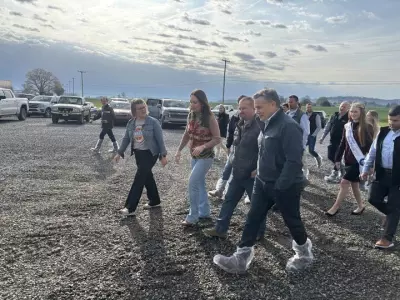
Secretary of Agriculture Brooke Rollins walking towards Talview Dairy Farms in Lebanon, Pennsylvania on April 14, 2025. (John Cole/Capital-Star)
Rollins: “They don’t have their facts right“
U.S. Secretary of Agriculture Brooke Rollins made a trip to central Pennsylvania on April 14 to tour multiple farms. She promoted the Trump administration’s focus on agriculture and defended the tariffs recently put in place on foreign products as a move to “save America.”
While speaking with reporters, she appeared to take issue with the statement from Shapiro’s administration that the USDA was canceling $13 million over the next three years in funding for that program.
Rollins said she respects Shapiro, but claimed that they “don’t have their facts right, or they’re playing games.”
“They’re trying to make this a political issue,” Rollins said to reporters at Martin’s Family Farm in Myerstown, Lebanon County. “The money is there.”
Rollins claimed that USDA has “released almost $1 billion dollars to food banks” nationally since she became secretary and added there was money sitting in state accounts to support food banks.
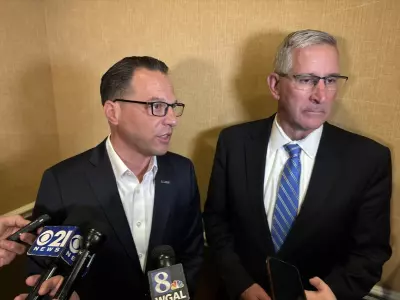
Gov. Josh Shapiro and Agriculture Secretary Russell Redding speak to reporters after addressing members of the Pennsylvania Farm Bureau on Tuesday, April 8, 2025. (Peter Hall/Capital-Star)
Pennsylvania agriculture secretary disagrees: “This is incorrect“
Just a few days after Rollins’ claim, Pennsylvania Agriculture Secretary Russell Redding penned a letter to her and the state’s congressional delegation refuting that claim that there are tens of millions in a bank account anywhere.
“To the contrary, Pennsylvania uses its own funds to operate the program, and seeks reimbursement from the USDA after those funds have been spent,” Redding wrote.
Redding said the previous rounds of funding via the LFPA program, prior to the cancelled contract, had totaled nearly $30 million in Pennsylvania and said that the state’s agriculture department has been “proud” to partner with USDA on the initiative.
Of that $30 million, he noted the state has received reimbursements of $17.8 million for money it has spent under the program thus far, and has already submitted a reimbursement request for an additional $9.1 million, which was approved for payment recently. This means that approximately $2.9 million is the remaining balance from the previous agreement.
The funding represented as much as 15% of the food banks’ purchasing budget, “a significant amount that provides millions of meals to hungry Pennsylvanians,” according to Redding.
“The Commonwealth looked forward to building on the success of these prior rounds of funding, and was grateful when the USDA committed an additional $13 million to Pennsylvania through the LFPA25 allocation,” Redding said, referring to the money that was slated to be allotted to the state under the most recent contract signed in December.
“Through the end of July, we will continue to spend all remaining program dollars under the second round of funding, as required by the terms of our cooperative agreement,” Redding wrote.
Redding said he has still not received a response from the USDA from his initial letter on March 25 and asked that the USDA reconsider its decision to terminate the most recent contract, which would provide $13 million for the program over the next three years.
“Pennsylvania has held up its end of the bargain. LFPA funds have been used by food banks across the Commonwealth to buy food directly from Pennsylvania farmers, in furtherance of the program’s essential goals,” Redding wrote.
The USDA did not respond to a request for comment from the Capital-Star about Redding’s letter.
Food banks hold out hope
As food banks wait to see the outcome in the ongoing saga, they tell the Capital-Star that they are already being impacted by this decision.
The Central Pennsylvania Food Bank said they are “leaning heavily into getting as much help as possible from donors right now.”
“There is no way to make up the gap, but we are working harder than ever to do what we can,” Lisa Rashid, Central Pennsylvania Food Bank Senior Development Manager said. “Our neighbors looking for assistance will also likely get less, as we try to stretch what we have among even more people needing our help during this difficult hunger crisis we are in, with the cost of food rising and people struggling to make tough financial choices.”
The Greater Pittsburgh Community Food Bank said the LFPA funding and TEFAP CCC bonus helped them source 6.3 million pounds of food annually, which accounts for 13% of the total food they are currently distributing.
“The reduction in USDA commodities, combined with potential cuts to SNAP, could make it more challenging for the Food Bank to get food to our neighbors who need it most,” said Colleen Young, Director of Government Affairs for the Greater Pittsburgh Food Bank.
Both food banks aren’t giving up hope just yet though and offered a few potential solutions, in addition to reversing the decision to cancel the LFPA program, that would assist them. One would be for the legislature to pass Shapiro’s funding proposal for both the State Food Purchase Program, also known as SFPP, and the Pennsylvania Agricultural Surplus System, referred to as PASS.
SFPP provides cash grants to counties for the purchase and distribution of food to low income individuals and is intended to supplement the efforts of food banks and other similar organizations aiming to reduce hunger.
PASS allows the state’s agriculture industry to donate food products to the non-profit sector who assist Pennsylvanians at risk of hunger. Through this program, the agricultural industry is reimbursed for the costs associated with donating these foods.
The other suggestion from the food banks would be for people to reach out to their elected representative.
“To make sure they understand the severity of food insecurity in our region and the importance of food resource programs,” Young said.
Pennsylvania Capital-Star is part of States Newsroom, a nonprofit news network supported by grants and a coalition of donors as a 501c(3) public charity. Pennsylvania Capital-Star maintains editorial independence. Contact Editor Tim Lambert for questions: [email protected].

